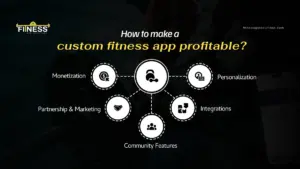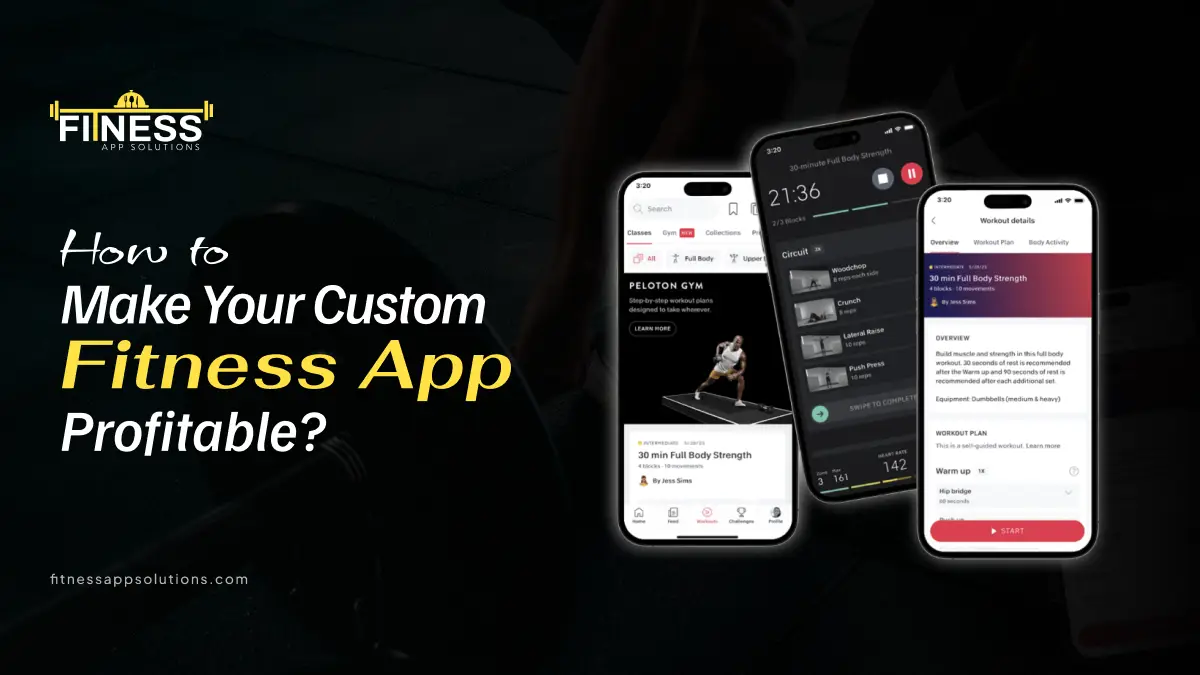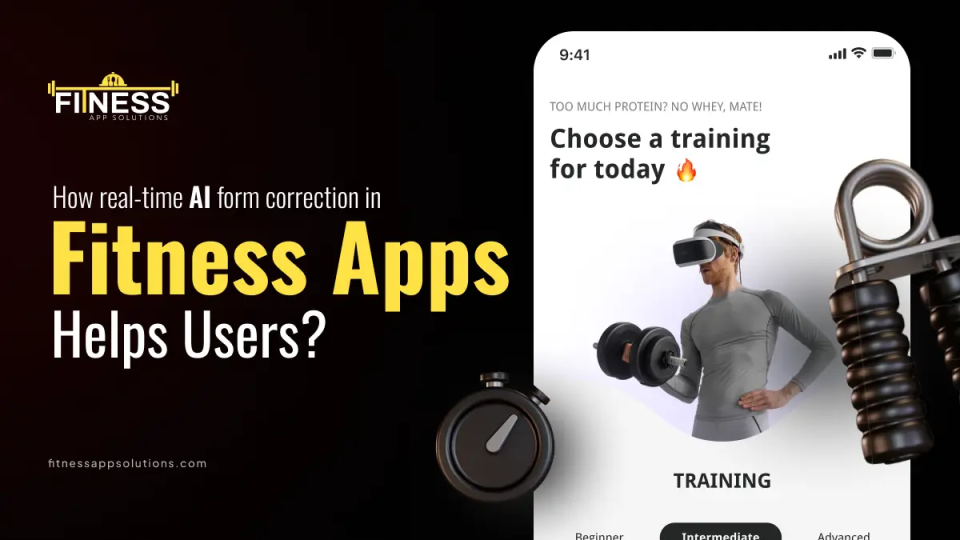Creating a custom fitness app is just the beginning to grow in the fitness business industry. As per the fitness app market analysis, the Fitness business is anticipated to reach an incredible $240 billion by 2030. There is immense potential for entrepreneurs and developers to turn their ideas into profitable ventures by fitness app development.
But here is the reality: not every app succeeds financially. Many developers pour time and resources into building features like workout trackers and nutrition logs, only to struggle with monetization.
If you are wondering how to develop a fitness app that generates steady income, you are in the right place. This guide dives deep into revenue strategies for fitness apps. We will explore factors influencing profitability, step-by-step ways to make your custom fitness app lucrative, common pitfalls, and solutions.
What are the factors effecting fitness app revenue?
Fitness app revenue has several interconnected elements to determine how much your app earns. Understanding these factors is crucial:
User Engagement
Engagement keeps users returning, so it directly impacts the revenue generation. Interactive features like challenges and trackers boost daily use. Engaged users upgrade with premiums or engage with ads more. Apps with gamification see higher retention, leading to better monetization.
Marketing
Visibility drives downloads in a market with thousands of apps. So, using social media ads, influencers, and app store SEO can help you to reach a broader audience. Targeted campaigns can also increase installs eventually. Allocate budget on a prior basis for organic growth.
Scalability
As users grow, your app must handle increased load without crashes. Cloud services like AWS, Google Cloud, etc., enable easy scaling. Modular design prevents downtime, ensuring steady revenue even during peaks.
User Retention
User retention costs less than acquiring new users. By offering premium services, discounts, and other interesting offers, a fitness app can ensure high user retention and build a sense of trustworthiness.
Niche Targeting
Focusing on specific groups like beginners or seniors reduces competition and builds loyalty. Tailored content allows premium pricing and faster growth through referrals.
How to make a custom fitness app profitable?

Follow these revenue strategies for a fitness app to make it more profitable:
1.Monetization
Choose monetization models that align with your target audience to ensure consistent revenue flow. A well-planned mix of models provides both stability and growth, while keeping the user experience positive. The goal is to offer value first, then gradually nudge users toward paid options.
Freemium Model
Offer essential features for free while locking premium workouts, meal plans, or advanced analytics at a generous price. This helps build trust and lowers entry barriers while encouraging upgrades. Continually highlight premium benefits through subtle prompts and trial access.
Subscriptions
Provide tiered plans (basic, standard, premium) with flexible pricing. Free trials or discounts can reduce hesitation and increase conversions. Subscriptions increase lifetime value per user and ensure recurring monthly or annual revenue.
In-App Purchases
Sell add-ons like specialized workout packs, diet recipes, or meditation guides. These microtransactions offer low-commitment entry points, which can scale revenue. Tailor recommendations based on user habits for maximum impact.
Advertisements
Use relevant, non-intrusive ads such as rewarded videos or product placements. They deliver daily revenue per active user while maintaining a balanced app experience. Ensure ads feel like a bonus rather than a disturbance.
2.Partnership & Marketing
Strategic collaborations expand brand visibility and create additional income streams. By ali
gning with fitness-related companies, your app gains both credibility and access to new audiences. Partnerships also offer mutual promotion benefits.
Sponsorships
Partner with fitness equipment brands, health food companies, or gyms to showcase featured content. This provides cash flow, exclusive deals, and exposure to new user bases. It also enhances brand authority.
Affiliate Marketing
Promote trusted products such as supplements, fitness gear, or wellness gadgets through affiliate links. Every purchase via your app generates commissions, while users benefit from curated recommendations.
Sponsored Content
Collaborate with brands to create branded workout challenges, nutrition tips, or wellness blogs. This drives engagement while monetizing seamlessly, making users feel they are gaining value rather than being sold to.
3.Community Features
Social and community-driven features build stickiness, boosting user engagement and retention. When users feel part of a community, they are more likely to stay active and loyal to the app.
Social Media Integration
Allow users to share their progress, milestones, and achievements across platforms. Features like leaderboards or badges foster healthy competition and encourage viral growth.
User-Generated Content
Let users share custom workout routines, meal plans, or transformation stories. This adds authenticity, enhances trust, and doubles as organic marketing.
Community Building
Introduce forums, group challenges, or local meetups to strengthen bonds among users. Active communities foster loyalty, reduce churn, and attract new members through word-of-mouth.
4.Integrations
Tech integrations increase usability and broaden the app’s ecosystem. Supporting multiple platforms ensures convenience, while wearable syncing makes the app more indispensable.
Cross-Platform Integration
Allow access across devices, like smartphones, tablets, web apps, for maximum flexibility. This makes workouts seamless and appeals to users who prefer switching between devices.
Wearables
Sync with fitness trackers, smartwatches, or heart rate monitors for real-time performance tracking. This not only adds tangible value but also justifies higher subscription pricing.
5.Personalization
Personalized experiences make users feel valued, improving satisfaction and willingness to pay. Tailoring workouts, nutrition, and guidance ensures the app adapts to their lifestyle.
Virtual Coaching
Provide AI-driven or expert-led coaching through videos and interactive sessions. Flexibility in modifying plans makes it appealing for beginners and advanced users alike.
Customization
Enable users to personalize workouts, diet plans, and goals based on fitness levels, preferences, and budget. This sense of control boosts motivation and retention.
AI-Driven Coaching
Use AI to recommend adaptive routines that evolve with user progress. Smart personalization justifies higher subscription rates and increases long-term loyalty.
What are the common challenges and their solutions?
| Challenge | Solution |
|---|---|
| High Development Costs | Use no-code tools for MVPs and outsource to save development costs. |
| User Acquisition | Optimize app stores and use influencers for targeted buzz. |
| Data Privacy | Encrypt data and follow regulations like GDPR for trust. |
| Motivation Burnout | Gamify features and send nudges to maintain interest. |
| Technical Glitches | Rigorous testing and agile updates prevent issues |
| Monetization Resistance | Start with free value and test pricing gently. |
Conclusion
Making your fitness app profitable comes down to one simple truth: solve real problems for real people. The strategies we’ve covered—freemium models, smart partnerships, community building, and personalization—only work when they’re built on a foundation of genuine user value.
Start with understanding what your users actually need, not what you think they want. Focus on engagement and retention before pushing for revenue. When users find your app indispensable to their fitness journey, monetization becomes the natural next step.
The fitness industry’s growth is undeniable, but success isn’t guaranteed. Build trust first, iterate based on feedback, and remember that the best revenue strategy is creating something people can ‘t live without.
Ready to boost your fitness app revenue? Contact us to develop a highly profitable fitness app!
Frequently Asked Questions (FAQs)
What is the best monetization model for a new fitness app?
Freemium works well for beginners, as it builds a user base quickly. Transition to subscriptions for a steady income once engaged.
How much does custom fitness app development cost?
It ranges from $50,000-$150,000, depending on features. Factor in ongoing maintenance for scalability.
Can ads really profit without annoying users?
Yes, with non-intrusive placements and relevant partnerships. Aim for rewarded ads to keep UX positive.
How do I improve user retention in my app?
Add gamification, personalization, and community features. Regular updates and notifications help too.
Is AI essential for profitable fitness apps?
Not essential, but it boosts personalization and efficiency, leading to higher engagement and revenue.



